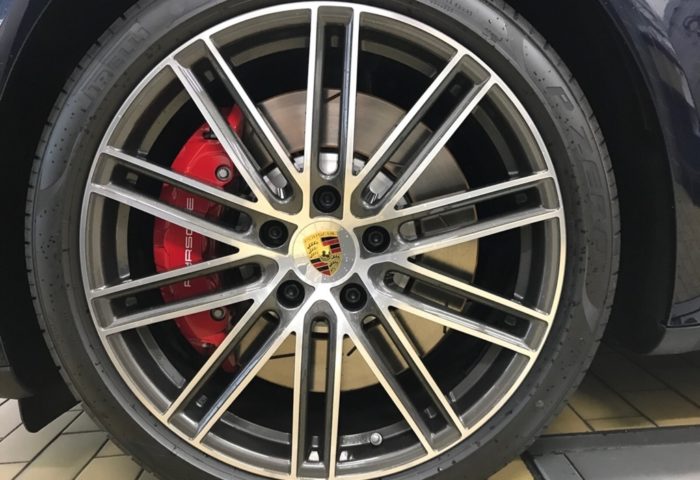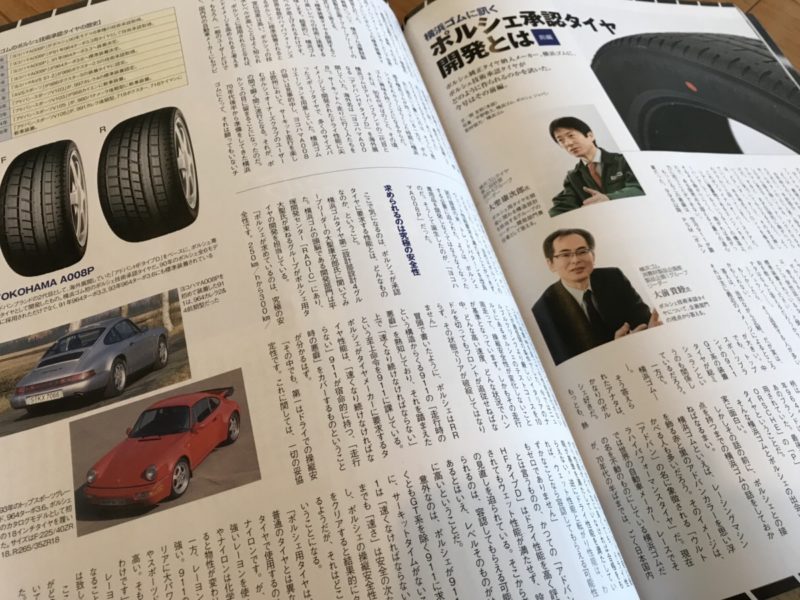The Meaning of the "N" (Number) in Porsche Approved Tires and Behind the Scenes of Approved Tire Development
Published Date: 2018.09.18

N○" for Porsche certified tires
The other day, when I was looking at the certified tire list information on Porsche Japan's official website to find out about Porsche's certified tires for the Panamera, I wasN0, N1, N2, N3, N4" is indicated in the specification column next to the tire name.I found the

The "N" is the German word "NORM."(Standards, regulations, criteria)I know it means certified tires because it's an acronym forWhat do the numbers next to N mean?Porsche Japan official websitePorsche Porsche N markpage, and this is what it said.
All tires available from Porsche Service Advisors at authorized Porsche dealers have been meticulously tested and certified by Porsche. This can be identified by the N mark, which is indicated in the tire's technical data by the abbreviations N0, N1, N2, N3, N4, N5, and N6. This abbreviation indicates the technical status at the time of certification and the numbers increase continuously.
Hmmm... I think I understand, but I don't know... (-_-)
A little more research.The number next to the "N" indicates how many generations of that tire series have been certified.The first tire certified will be "N0" and the number will increase to N1, N2, N3, etc. each time the tire specifications are changed with a tire model change and a new tire is certified.
So, there are different numbers next to N for the same tire of the same inch. For example, as shown in the figure belowThe same 19-inch Pirelli P-Zero" tires are also available in N0 and N1.

In that case, theThe higher numbered "N1" is a higher performance tire, as it is the newly certified tire for the model change.This means. Tire prices also seem to be slightly higher with higher numbers.
Article from 911DAYS
I can't believe that once you get certified, you have to get certified again for every tire model change.It must be pretty tough to keep being a certified Porsche tire."Then, I came across a feature article in "911DAYS vol. 68," a Porsche magazine my husband had bought.
Yokohama Rubber talks about Porsche-approved tire development: Part 1
We asked Yokohama Rubber, a supplier of genuine Porsche tires, how Porsche technology-approved tires are made. This is the first part of the interview.
Oh...I'm a little curious about the Polish!
So I would like to share some of what was written there.
Yokohama Rubber's representative said
Although Michelin has a strong image as the standard tire manufacturer for Porsche, Yokohama Rubber tires have also been installed since the time of the 964 Carrera.Of course, YOKOHAMA tires are still used on the late-model 991 Carrera, 718 Boxster, and Cayman.
It is said that Porsche is still famous for making tire makers cry.Due to the rear engine rear drive structure of the 911, the car exhibits strong oversteer and understeer characteristics when driving.Nevertheless, in order to pursue "speed" and "safety" to the utmost limit, Porsche places strict demands on tire manufacturers.

So what kind of performance does Porsche require from its approved tires?
Porsche's requirements for tire manufacturers areUltimate safety."The minimum requirement is that there should be no change in operational safety even after continuous driving at 250 km/h to 300 km/h. Specifically, theTwo laps of the Nürburgring in Germany at full throttle(40+ km)I can run or even run 10 laps on the Porsche test track in Nardo, Italy, which is tougher than the Nürburgring, and there is no change in performance.Things to do.
In addition, the front must be able to follow and the rear must not break down no matter how high the speed or under what conditions the vehicle is steered during the trip.
Maneuvering stability in dry conditions is most important.
The most important of these areStability in dry conditions."It is said that. Wet performance and rolling performance are only required after the dry performance criteria are met.
Amazingly.There is no track time item in Porsche's tire performance requirements for 911s (except for the GT series).Yes, the 911 must be fast, but more important than speed is safety. Also, if the car meets Porsche's required level of handling stability, the time is made to be faster as a result.
What materials are used for tires?
The materials used in Porsche-approved tires are different from those used in ordinary tires.General tires are made of polyester or nylon, but for Porsche-approved tires, heat-resistant rayon is used.Polyester and nylon are chemical materials that eventually melt at high temperatures, but rayon is a natural material that is resistant to heat.
In addition, the 911 is likely to be driven at high speeds and sport driving with a lot of power applied to the rear, which can easily heat up the tires in the first place.Nevertheless, the material must be rayon for maximum operational stability.However, rayon is more costly, so that part is a disadvantage, but they say it is necessary to improve tire performance.
Well, it's amazing! I always think that Porsche, Yokohama Rubber, and other manufacturing companies are truly amazing. I have a tendency to be a bit of a random person, so if something is 70% or 80% done, I'll probably be satisfied and say, "Well, that's enough" (explosion), so I bow down to their dedication in their pursuit.
There were many other interesting articles in this issue of "911DAYS," and I hope to find time to read them all.
Follow me if you like this blog!



Comment ( 0 )
Trackbacks are closed.
No comments yet.